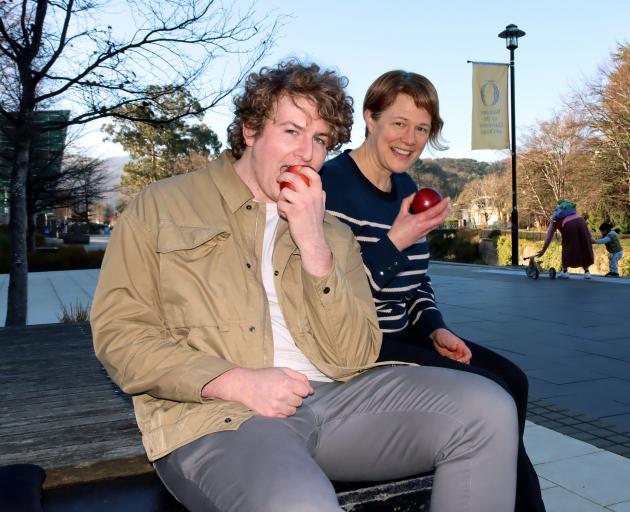Science
Master’s Student Unlocks Genetic Secrets of Heritage Apple Varieties

Aaron Hewson, a master’s student in plant biotechnology, is conducting groundbreaking research on over 300 apple varieties from the Jim Dunckley Heritage Orchard in New Zealand. This orchard, established by the Coastal Otago Branch of the New Zealand Tree Crops Association 25 years ago, is recognized as one of the most diverse collections of apple cultivars in the country. The collection features uniquely named varieties such as Peasgood Nonsuch, Nonnetit Bastard, Warner’s King, and Albany Beauty.
Hewson’s research aims to help preserve and propagate these heritage cultivars through accurate genetic identification. “I am doing this research for them so they can continue to preserve and propagate the heritage cultivars, with confident identification by genetic means,” he explained. The apple cultivars were initially collected in the 1990s by Jim Dunckley from various locations across Otago and Southland, with the majority sourced from Clyde, where an old Plant & Food Research orchard was located.
The orchard presents a unique challenge due to the local naming conventions. Some trees have names given by local farmers that reference nearby landmarks, which do not always align with their genetic profiles. For instance, Hewson noted, “There is one case where we had a Plant & Food apple called Granny Smith, the classic one you get in supermarkets, and another one called Lord Lambourne. These two cultivars should be really different, but the samples were saying they were genetically the same. So one of those names has to be wrong.”
To investigate these discrepancies, samples of the apple varieties were collected by university staff and students from the Plant Biochemistry Lab. After being labeled and freeze-dried, the samples were sent to a laboratory in France for analysis, assisted by Plant & Food Research, now part of the Bioeconomy Science Institute. Hewson acknowledged the support of his co-supervisor, Dr. Elena Lopez-Girona, in this process. “It has been very beneficial to have her expertise,” he said.
The research employs a technique known as genotyping by SNP chip, a laboratory process that examines around 50,000 known DNA hotspots in an apple leaf. This method generates a quick genetic fingerprint, enabling researchers to determine whether two trees are the same variety or different. Given the stringent biosecurity regulations that complicate the importation of new apple genetic material, the local collection may prove essential for enhancing disease resistance and other desirable traits.
Hewson highlighted the alarming fact that while there are approximately 10,000 different apple varieties worldwide, all commercial varieties trace back to just six original apples, resulting in a narrow genetic base. “If we talk about the entire amount of apples across the world, there is something on the order of 10,000 different varieties. But all of our commercial varieties, no matter how many there are, they all come from six apples, so it is really, really narrow,” he stated.
The research also has broader implications for the future of apple breeding in New Zealand. Associate Professor Lynnette Brownfield, Hewson’s other co-supervisor, emphasized the importance of identifying the genetic makeup of the orchard. This knowledge could assist breeders in discovering new genetic traits, including disease resistance, which could expand future breeding options.
The Coastal Otago Branch of the New Zealand Tree Crops Association, which owns the orchard, will determine how to utilize the findings from this research. The objective is to assign unique identities to all trees within the collection, ensuring comprehensive knowledge of the genetic diversity available. This initiative will facilitate collaboration with apple breeders, ranging from backyard growers to larger organizations such as Plant & Food Research, and provide vital germplasm as required.
Through this research, Hewson not only contributes to the preservation of New Zealand’s apple heritage but also paves the way for a more resilient future in apple cultivation.
-

 World4 months ago
World4 months agoTest Your Knowledge: Take the Herald’s Afternoon Quiz Today
-

 Sports4 months ago
Sports4 months agoPM Faces Backlash from Fans During Netball Trophy Ceremony
-

 Lifestyle4 months ago
Lifestyle4 months agoDunedin Designers Win Top Award at Hokonui Fashion Event
-

 Entertainment4 months ago
Entertainment4 months agoExperience the Excitement of ‘Chief of War’ in Oʻahu
-

 Sports4 months ago
Sports4 months agoLiam Lawson Launches New Era for Racing Bulls with Strong Start
-

 World5 months ago
World5 months agoCoalition Forms to Preserve Māori Wards in Hawke’s Bay
-

 Health4 months ago
Health4 months agoWalking Faster Offers Major Health Benefits for Older Adults
-

 Lifestyle4 months ago
Lifestyle4 months agoDisney Fan Reveals Dress Code Tips for Park Visitors
-

 Politics4 months ago
Politics4 months agoScots Rally with Humor and Music to Protest Trump’s Visit
-

 Top Stories5 months ago
Top Stories5 months agoUK and India Finalize Trade Deal to Boost Economic Ties
-

 Health2 months ago
Health2 months agoRadio Host Jay-Jay Feeney’s Partner Secures Visa to Stay in NZ
-

 World5 months ago
World5 months agoHuntly Begins Water Pipe Flushing to Resolve Brown Water Issue









